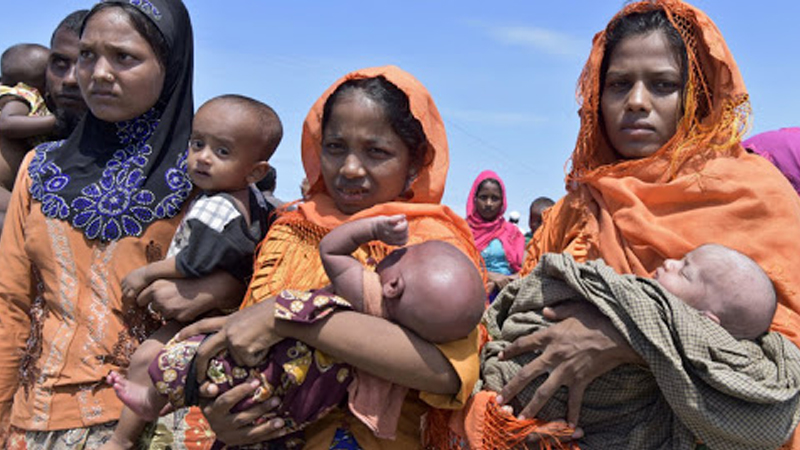Bangladesh ensures full abortion care to save Rohingya women

An international study has hailed the provision of ‘comprehensive abortion care’ for Rohingya women in Cox’s Bazar camps, and said that it showed such care can be implemented in a humanitarian setting.
“The favourable legal environment of menstrual regulations (MR) in Bangladesh and collaboration between organisations and the government made provision of comprehensive abortion care possible,” Maria Persson, Sexual and Reproductive Health Expert at Ipas Bangladesh, said while presenting the study at an international conference.
She presented the results of a qualitative study on healthcare providers’ experiences of providing comprehensive abortion care in the humanitarian setting in Cox’s Bazar at the 8th session of the virtual 10th Asia Pacific Conference on Reproductive and Sexual Health and Rights (APCRSHR10).
The APCRSHR10 Secretariat in Cambodia, Reproductive Health Association of Cambodia (RHAC) and the CNS co-hosted the session with Amy Williamson, Country Director, Marie Stopes International, Cambodia, in chair.
The session marked the International Safe Abortion Day on Sep 28 which was themed on “Telemedicine, self-managed abortion and access to safe abortion in the context of COVID-19 pandemic”.
Unsafe abortion contributes to maternal mortality and morbidity. In humanitarian settings women and girls face increased risk of unsafe abortion.
Bangladesh has given shelter to over 1.1 million Rohingya refugees from Myanmar in Cox’s Bazar. Most of the women faced large-scale incidences of rape and sexual violence by the Myanmar military.
The government leads the humanitarian response.
In March 2019, there were142 basic healthcare facilities and 8 hospitals for the Rohingyas, managed by the government of Bangladesh or NGOs. Menstrual regulation, post-abortion care, and contraceptive services were provided free of charge at 29 facilities.
Maria Persson said her study explored providers’ perception and experience of providing comprehensive abortion care, which includes menstrual regulation - a procedure to regulate the menstrual cycle to ensure a non-pregnancy; post-abortion care and contraceptive provision and counseling. It also identifies obstacles and facilitators in service provision.
She said healthcare providers experienced a “supportive working” environment where necessary supplies and equipment were available. However, implants were not readily available and not all facilities provided IUD.
Adopting the same language (dialect) was experienced as facilitating trust. They took pride in their work and created a positive identity that generated a safe space to provide the services.
However, there was a lack of knowledge on the abortion law and the MR policy and personal attitudes affected some providers in their encounter with women.
One of the main challenges expressed was lack of awareness and acceptance of MR and contraceptive services among the Rohingya population.
Healthcare providers understanding of Rohingya women’s needs also influenced comprehensive abortion care provision.
Healthcare providers perceived the Rohingya community as patriarchal and Rohingya women as religious and conservative.
“They usually don't take implants and IUD because they think that they will go to hell if they die after taking this in their body”, said one paramedic during the in-depth interview.
So they adjusted counselling and used religion and motherhood to increase acceptance.
“We tell them that MR is not a sin, because it will save your family, make you and your child happy. You already have a child. If you take another baby now, you will get a bad impact on your health. You cannot give your children enough care. So take the MR and care for your family,” said a paramedic.
Main barriers to comprehensive abortion care are lack of prioritization; lack of training; lack of equipment and supplies; lack of knowledge on the abortion law; and stigma and negative attitudes affecting service provision.
“The study findings suggest comprehensive abortion care can be implemented, and can be scaled up in a humanitarian setting,” she said.
Integrating the full package of comprehensive abortion care services in the primary healthcare system to address women’s multiple sexual and reproductive health needs, training on MR policy and abortion law and in-service training can improve quality of care and ensure that the care provided is woman-centred and non-judgmental, she said.
Dr Suchitra Dalvie, Co-founder and Coordinator of the Asia Safe Abortion Partnership (ASAP), said unsafe abortion related deaths are still very high in Asia Pacific and also in Sub-Saharan Africa.
“Unsafe abortion is caused by many problems beyond just healthcare service provision and hence the need for self-managed abortions. WHO recently defined self-care and came up with a fact sheet this year which talks about how access to self-care interventions can actually improve people’s autonomy,” she said.
“A pregnant woman should have enough accurate information to be able to self-assess her pregnancy and self-conduct the process of abortion without having to visit a medical facility- self-procure the pills whether online or through a chemist, self-administer them in a location of their choice. She should also be able to access a healthcare provider if need be at any stage of process”.



